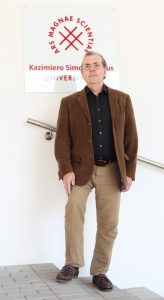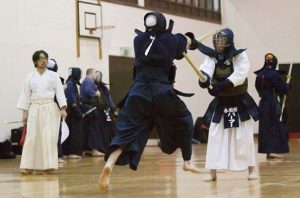Every spring semester Tony Palmer come to Lithuania to teach Kazimieras Simonavičius University (KSU) Aviation Management students. He is an aviation expert and has a great experience in the industry. “I like sharing my experience, delegating and seeing people grow”, says Tony.

Tony Palmer
Aviation is one of the fastest growing sectors in the world. How do you think, what are the reasons of this growth?
With population growth, increasing disposable income and hence propensity to travel, aviation will continue to grow to fill available infrastructure capacity. You didn’t ask if there are reasons this growth might be constrained and if you had I would say that environmental performance has to improve or growth may be restricted.
How young people may take an advantage of this situation?
There are many ways – travel and see the world or work in the industry. Fares are always going down in real terms – more airlines are striving for lower costs so they can compete so more places become accessible. With a bigger industry there are many roles in and serving the industry so study Aviation or Tourism for example and find a role.
What are the advantages of working in aviation sector?
This depends on the person – for me the industry has been great fun, provided many great experiences. I’ve travelled well and I’ve learned a lot!
Tell us more about your teaching experience. Why do you like teaching? Do you teach only at KSU?
I trained as an Engineer and then worked in Commercial Planning and Airline Strategy – my management style was as a coach. I was a mentor for new graduate entrants. I like sharing my experience, delegating and seeing people grow. As a consultant I delivered commercial training programmes to airlines and I was an interim manager (and coach) when a senior manager was in hospital for a long time. I then started teaching BSc students at my Alma Mata Kingston University, then took on a MSc course in France and now KSU in Vilnius. I have also been an external examiner at another UK University.
Could you tell us more about the most significant projects you did?
I was flight test engineer on Concorde and 747. I was instrumental in getting the licence for the first non-stop flights from the UK to Japan! At British Airways I made some major changes in the flying programme, introduced a concept of ‘Schedule Quality’, was lead in several alliance projects and project managed the introduction of the new crew systems. I was in the start up team for 2 low cost airlines: Hapag-Lloyd Express in Germany and Thompson Fly in the UK.
 How did you interest in kendo? What it means to you?
How did you interest in kendo? What it means to you?
It is a very interesting martial art from Japan, which I took up when I was in my early 20’s – I was looking for a meaningful activity that had discipline and structure and more than a competitive sport. I practice an ‘old school’ I.e. one that pre-dates the modern sport kendo. It’s hard to explain how important Kendo is to me. The principles are about continuous learning and development and luckily no need to stop when you get past the age that competitive sport becomes difficult to sustain.
Do you see any similarities between kendo and aviation?
Like other industries Aviation succeeds when everyone involved seeks continuous improvement – in skills, performance, technology and service. In that way it’s the same. There are always similarities between activities but I wouldn’t go too far with this comparison.
Sometimes people say that aviation is an illness (in a good way, of course!). They say that once it catches you, you fell in love with it for the rest of your life. Do you agree?
There are very few cures and withdrawal symptoms can be severe. That said there are many lessons that Aviation and other industries can share with each other so it’s not necessarily a lifetime career. Life long attraction certainly!
Share: